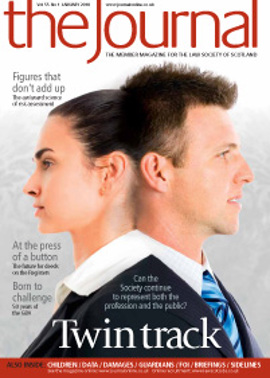Law of unintended consequences

The Adults with Incapacity (Scotland) Act 2000 came into force on 1 April 2002. It sets out in s 1 the general principles applying to guardianship and also, in s 57 for first applications and s 60 for renewals, the procedures which must be complied with when presenting applications for guardianship under the Act. In addition, on 3 July 2006 the Sheriff Principal of Glasgow and Strathkelvin issued a practice note making further provision in connection with such applications.
If an application complies with those provisions, the sheriff must fix a hearing, order answers to be lodged within a specified period if considered appropriate, and appoint service and intimation (Act of Sederunt (Summary Applications, Statutory Applications and Appeals etc Rules 1999 (SI 1999/929 as amended by SSI 2001/142), rule 3.16.2). For first applications, service has to be on, inter alia, the adult, the adult’s nearest relative, the primary carer, and the Public Guardian (rule 3.16.4(1)).
Where such an application is granted, the order subsists for three years, or for such other period, including an indefinite period, as the court may determine (s 58(4)).
The provisions in practice
Experience has shown that many applicants and/or relatives attend the hearings fixed, and that the presence of the applicant’s solicitor is invaluable, in that the practitioner directly involved is available to answer any questions which may arise, and respond to any change in circumstances or new information. The court benefits greatly from the assistance of practitioners in this regard and, as a result, the vast majority of applications can be determined with only one appearance being necessary.
Renewals and the 2007 Act
Applications for renewal of orders granted under the Act were originally required to comply with all of the same general procedures, but with the passing of the Adult Support and Protection (Scotland) Act 2007, some aspects of these were relaxed, with the intention of simplifying the renewal process.
In a recent case, reported as G’s Guardian, Applicant 2009 SLT (Sh Ct) 153, at paras 10-17, I expressed certain views about the rule on intimation and service in the case of applications for renewal, as apparently affected by the amending provisions in 2008 of the Act of Sederunt (Summary Applications, Statutory Applications and Appeals etc Rules) Amendment (Adult Support and Protection (Scotland) Act 2007) 2008 (SSI 2008/111).
It is not unknown for adults, particularly those who were subject to proceedings under the pre-2000 law, and whose curators (who became guardians by operation of sched 4 to the 2000 Act) have been in office for many years, to recover at least partial capacity and to be able to express views about the future administration of their estates. I have myself presided over such a case, but if intimation of the intention to renew guardianship is not made to the adult in such cases, as seems to be implied by para 3(2)(b) of the Act of Sederunt of 2008, then the adult and the adult’s relatives may not know about it.
The latest problem
In this article, I draw attention to another problem which has arisen as the unintended result of one of the relaxations introduced by the 2007 Act, namely, the provision inserted into the 2000 Act as s 60(4A), which provides that a sheriff may determine an application for renewal of guardianship without hearing the parties.
It should be noted that that provision does not specify that such an application can be determined without fixing a hearing, merely that it can be determined without hearing the parties. The court must still comply with rule 3.16.2 and fix a hearing, order answers if thought appropriate and order intimation and service, and whatever the correct view is about the extent to which there must be intimation in cases of applications for renewal, there still has to be some intimation, time allowed for answers or objections to be lodged, and a known date upon which the application will then be determined, albeit without the need for parties to attend. Of course, if answers or objections are lodged, then the solicitor for the applicant, at least, will require to attend and be heard.
Who has to apply for renewal?
Those who held office as curators and tutors under the old law did not require to ask the court to renew their appointments, which did not have a time limit, and were not required to do so when the 2000 Act came into force and made them guardians, but they became obliged to do so as a result of s 60(17)(a) of the 2007 Act. Guardians appointed after an application under the 2000 Act, but whose appointment is time limited, also require to apply for renewal, assuming the conditions justifying guardianship still apply.
In both situations, it is now routine for solicitors to request the court to determine the application without the need to hear the parties, and the interlocutors of this court now state that the application will be heard on a specified date, but that in the absence of notice of opposition or answers, the case will be determined on that date without the need for parties to be heard.
The unintended consequence
However, that provision, which is designed to reduce cost and simplify the renewal process, has in many cases produced the opposite result, since it means that the court is deprived of the assistance of the applicant’s solicitor at a hearing at which a number of issues may require to be resolved. Ironically, in some cases the hearing has had to be continued for an attendance by the solicitor, or even for re-service, where both might have been avoided if the solicitor had attended in the first place.
Processing of the most recent batch of renewals at this court has highlighted a number of areas where the court has been hindered from the immediate determination of such applications, either by deficiencies which could have been remedied if there had been a solicitor at the hearing, or by the need to react to information received since the application was lodged.
In what follows, I set out the most common situations where difficulties have arisen which could not be resolved without recourse to the applicant’s solicitor. These are:
- Notwithstanding para (f) of the practice note of 3 July 2006, which requires applications for financial guardianship to contain such information, many applications for renewal of financial guardianships contain no details about the existing level of the estate or caution. Caution will be in place already where the applicant was appointed under the old law. Although the court now has the power to dispense with the need to find caution, it cannot decide on the level of caution, or whether to dispense with the need to find it, unless it has this information.
- Often, important observations are made to the court by the Public Guardian upon receipt of intimation, but if parties or their solicitors are not present, there is no one at the hearing who can address these. One observation commonly made relates to the situation where the adult may own and still reside in heritable property but is, or may soon become, unable to sustain living in the community, and the guardian requires the power to be authorised to sell the heritable property. In such a situation the consent of the Public Guardian is required to the sale (sched 2, para 6(1) to the 2000 Act). Often the necessary words are omitted from the powers craved, and para 6(1) is simply overlooked.
- Often, applications are silent on the question of expenses, and ambiguous on the length of the order sought, e.g. “indefinitely or for such period as to the court seems appropriate”. Where a solicitor is present, it is the practice in this court always to deal with the issues of caution, duration and expenses, but where none is present, this may not be possible.
- Service may not have been effected, and in some cases this has not been checked by the solicitors. There may be returned citations, or no form 22 (certifying service on the adult), and the case may have to be continued for re-service. Often, when conducting a hearing where the applicant’s solicitor is present, such difficulties can be resolved, as the solicitor is able to produce other evidence of service, either by documentary production or by making telephone calls.
- Often there is no information as to whether the adult owns heritable property, or even if there is, the powers sought do not adequately describe that, which will cause further expense to be incurred if there is to be a subsequent sale. Such detail was not required in orders granted pre-2000, but is required for orders granted under the Act.
- If any of these sorts of issues are raised when there is a solicitor present, and it becomes obvious that additional or amended powers are required, such issues can be easily dealt with, but not if there is no representation.
- Solicitors are respectfully reminded that the medical report which must accompany a renewal application where the adult is suffering from mental disorder must come from a practitioner who is approved under s 22 of the Mental Health (Care and Treatment) (Scotland) Act 2003 (s 60(3A)(a) and (b) of the 2000 Act, as read with s 57(3)(a) and (6B)).
Action by practitioners
There will be other areas where the court is placed in difficulty in processing renewals in the absence of the solicitor for the applicant, and it is no doubt perverse that a provision designed to reduce cost may have precisely the opposite effect, but I would respectfully ask practitioners to recognise the burden of administration which is required by the sheriff clerk’s staff, and that where the expense of the application is being borne by the adult’s estate, it is appropriate to try to keep that to a minimum.
I would ask practitioners to ensure, therefore, that all relevant information is presented to the court in the application, and that they respond in writing to any observation which may have been made by the Public Guardian or any other party, failing which the court may be forced to revert to a position where solicitors are routinely required to attend renewal hearings.
John A Baird is a sheriff of Glasgow and Strathkelvin
In this issue
- Forward thinking
- Renewal of transitional guardianships
- End the navel-gazing
- Who speaks for lawyers?
- Reasons to be hopeful
- The full picture
- Hearing and speaking
- Law of unintended consequences
- More prejudicial than probative?
- One giant leap
- If the cap fits
- Half a century of strife
- From the Brussels office
- Law reform update
- Send in the SaaS
- Ask Ash
- Words and sentences
- Two in one
- Enough to turn you to drink
- Uncertain security
- Protections with legs
- Working for the estate
- Home defences
- Splitting from the taxman
- Scottish Solicitors' Discipline Tribunal
- Website review
- Book reviews
- Route to freedom
- Steady as she goes is market forecast






